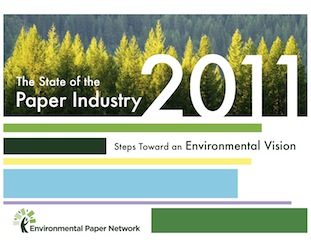Coalition of Conservation Groups Releases Progress Report for Paper Industry
Data on sustainability indicators shows massive impact, trends over last decade reveal environmental achievements driven by marketplace leadership
Published 07-14-11
Submitted by Environmental Paper Network

A coalition of leading conservation organizations released a comprehensive sustainability report today tracking progress on key pulp and paper industry indicators over the previous decade. The report, titled The State of the Paper Industry 2011: Steps Toward an Environmental Vision, provides data and analysis about fiber sourcing, recycling, consumption, paper production, and the paper industry's impact on communities and the climate crisis.
The report is a follow-up to the EPN's landmark report published in 2007, The State of the Paper Industry: Monitoring the Indicators of Sustainability, which established the key indicators to monitor the industry. Both reports measure the progress and challenges of the industry and conservationists toward achieving the EPN's Common Vision for Transforming the Paper Industry.
"Our new report indicates that marketplace responsibility and leadership over the last decade has been the driver of on-the-ground conservation achievements in endangered forests," said Joshua Martin, Director of Environmental Paper Network.
The report again reveals the massive scale of the environmental impacts of paper products. This includes paper production's intensive energy usage, and the urgency of efforts by all stakeholders to continue transforming the industry through waste reduction and the adoption of cleaner, more efficient, and less destructive methods of paper manufacturing and forest management.
"It proves that consumer behavior and corporate responsibility have a major effect on the state of the paper industry, and that the paper industry has a massive amount to do with the state of the climate, forests and biodiversity that our children will inherit from us," continued Martin. "That should provide further encouragement and motivation to all stakeholders to continue efforts for even greater progress and to solve remaining and emerging challenges."
Some indicators of progress from the report include:
- A reduction in wasteful paper use leading to lower consumption in North America, though the reduction has certainly been affected largely by the economic downturn as well. The average North American used 504 lbs / 228.61 kg of paper in 2009, vs 652 lbs / 295.74 kg in 2005. (RISI)
- Skyrocketing growth in land area certified by the Forest Stewardship Council (FSC), the only certification system broadly embraced by the conservation community. The number of acres certified by FSC in North America has grew by 66 million acres (26.7 million hectares) between January 2007 and January 2011. (FSC)
- Significant increase in the percentage of paper recovered/recycled and reduction in paper entering the landfill. The U.S. paper recovery rate rose from 46% in 2000 to a record high 63.4% in 2009. (AF&PA) Landfill deposits of paper are down from 42 million tons in 2005 to 26 million tons last year. (US EPA)
- Conservation agreements, such as the Canadian Boreal Forest Agreement, promise groundbreaking models of collaboration and are historic in their massive scope.
Some critical climate and conservation challenges ahead include:
- Upholding and fully implementing conservation agreements, and securing additional protections for ecologically valuable forests still endangered by logging and industrial development.
- Addressing threats to endangered forest hotspots around the world driven by North America’s continuing high levels of consumption.
- Reducing the energy intensity of paper production and adopting efficiency technology in North America. The industry uses on average approximately 24.5 Btu per Ton of product (AF&PA).
- Resolving the controversy over accurate carbon accounting for forest products and the impact of the carbon neutral myth, which harms the recycling industry and results in overconsumption of forest resources.
- Achieving further increases in recovery of waste paper and availability of recovered fiber for greater domestic utilization in North America. Recycled fiber has stayed steady at about 36% of all fiber for paper for the last decade. (AF&PA)
Download the report: http://environmentalpaper.org/state-of-the-paper-industry-2011.php
The Environmental Paper Network accelerates environmental transformation in the paper industry through collaboration and the coordination of a strong and diverse coalition of non-governmental organizations in order to protect forests, climate, water and communities. Learn more at our new website: http://www.environmentalpaper.org.
The Steering Committee of the EPN is Canopy, Climate for Ideas, Conservatree, Dogwood Alliance, ForestEthics, Green America, Green Press Initiative, National Wildlife Federation, Natural Resources Council of Maine, and Rainforest Action Network.

Environmental Paper Network
Environmental Paper Network
The Environmental Paper Network (EPN) accelerates environmental transformation in the pulp and paper industry in order to protect forests, climate, air, water and communities.
The EPN facilitates a powerful movement of independent organizations, strategically leveraging their collective expertise and resources, to initiate change and environmental improvement in the pulp and paper industry.
The EPN is led by a Steering Committee that includes: Canopy, Climate for Ideas, Conservatree, Dogwood Alliance, ForestEthics, Green America, Green Press initiative, National Wildlife Federation, Natural Resources Council of Maine, and Rainforest Action Network.
Other organizations which are active participants and/or serve on EPN Working Groups include NRDC, WWF-US, Greenpeace (US and Canada), Global Alliance for Incinerator Alternatives, Product Policy Institute, Environmental Defense Fund, Responsible Purchasing Network, Catalog Choice, and more.
More from Environmental Paper Network

